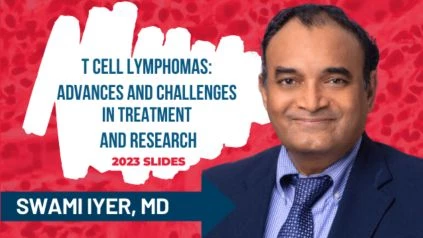By: Allen Wilbanks
Date: October 02, 2023
In a comprehensive discussion led by the esteemed Swami Lyer, MD, the focus centered on the evolving landscape of therapies for T-cell lymphomas. Dr. Lyer commenced the talk with expressions of gratitude, acknowledging the invaluable contributions of patients participating in clinical studies. The central theme revolved around elucidating the prospects of late and forthcoming treatments in T cell lymphomas, with an emphasis on the pivotal role of transplantation.
One of the primary challenges in managing T cell lymphomas is the intricate classification system. Dr. Lyer illustrated the complexity by highlighting the multitude of subtypes within mature T-cell lymphomas. While the classification has evolved over time, he highlighted the ongoing dilemma in effectively categorizing these diseases. This complexity has significant implications for treatment strategies, as each subtype may require a tailored approach.
Dr. Lyer underscored the dire need for innovative treatments, particularly for patients with limited therapeutic options. He illuminated the fact that many T cell lymphoma subtypes have historically displayed poor outcomes, even in the frontline setting. For instance, he pointed out that some rare varieties, such as T-cell prolymphocytic leukemia (TPLL) and adult T-cell leukemia/lymphoma (ATLL), often translate into survival measured in months rather than years. As he emphasized, this represents the “last frontier” in lymphoma that urgently requires effective interventions.
On the other hand, Dr. Lyer delved into the realm of cutaneous T-cell lymphomas, shedding light on the spectrum of disease presentation. He articulated how advanced stages of these lymphomas, particularly stages 2b and 4, can behave similarly to nodal lymphomas. This transformation, along with leukemic manifestations, typically leads to more aggressive outcomes. However, it was noteworthy that in these cases, outcomes were sometimes measured in years, offering a glimmer of hope.

